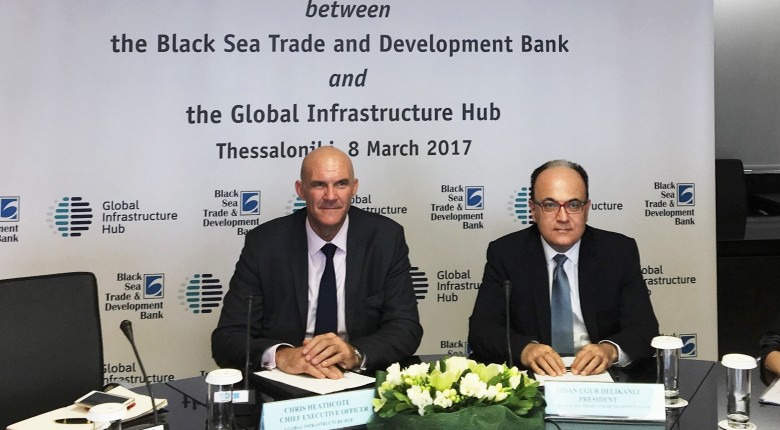1292 results found
Featured results



More results
Asian Infrastructure Investment Bank President Mr Jin Liqun met Global Infrastructure Hub Chief Executive Officer Chris Heathcote at the GI Hub’s Sydney office on April 3, where both parties provided briefings on their key work. Discussion focused on the GI Hub’s report undertaken for the G20 on the role of Multilateral Development Banks in “crowding-in” private finance for public infrastructure, which was released earlier this year. The GI Hub has already been in discussions with the AIIB on the recommendations in the report.
This publication analyses the relationship between several infrastructure indicators and income inequality in urban areas of the People’s Republic of China.

This publication aims to estimate the direct and indirect effects of infrastructure on firm productivity using firm level data from the People’s Republic of China using multiple regression techniques.


This document summarises the approach taken by Infrastructure Australia (IA) in assessing and prioritising initiatives and project proposals for placement on the Infrastructure Priority List (IPL). This process is part of IA's Assessment Framework, which is used to identify infrastructure initiatives and projects of national significance.



Una guía en español para ayudar a los países en desarrollo a evaluar el riesgo de inversión de infraestructura para proyectos del sector transporte en contratos de Asociación Público-Privada (PPP) ya está disponible a través de la página web del Global Infrastructure Hub (GI Hub).


Half of all global infrastructure investment will be needed in Asia from now until 2040, major new analysis by the Global Infrastructure Hub shows. And while so much of the region’s infrastructure growth has been in China, the focus will shift to South and South East Asian countries where infrastructure gaps remain very substantial.
This report reviews experiences with strategic infrastructure planning with a view to identifying international best practices.


Good governance of public infrastructure can thus yield substantial benefits for all. Based on a survey of 27 countries, this report provides an overview of current practices in infrastructure governance and presents practical tools to help policy makers better manage infrastructure.


Global infrastructure needs and Public-Private Partnerships were discussed when the Foreign Correspondents’ Association of Australia met the GI Hub today.
Global Infrastructure Hub Chief Executive Officer Chris Heathcote says quality public infrastructure can promote greater affluence and spark global growth. Mr Heathcote told a Public-Private Partnership Seminar in Athens that “infrastructure changes lives and changes economies”.
Pacífico Tres was created in 2014 to facilitate the construction of a c. 150km highway linking three of Colombia's most commercially important regions
This book discusses in detail the issues and challenges associated with infrastructure connectivity in Asia.

This policy brief outlines promising ideas to attract instiutional investors to pay for infrastructure they have not convinced pension funds or affluent individuals to invest, especially in emerging economies with untested issuers, The “tax-kicker” bond being proposed here could solve this issue.

A Memorandum of Understanding (MoU) between the Global Infrastructure Hub (GI Hub) and the Black Sea Trade and Development Bank (BSTDB) has been signed at the BSTDB headquarters in Thessaloniki, Greece.
Mark Moseley, the GI Hub’s Senior Director for Legal Frameworks and Procurement Policies gave a presentation at a seminar on Future Ready: Sustainable Cities – Indonesia Infrastructure in Focus held in Jakarta, Indonesia on 7 March 2017.
Government officials from the Philippines visited the GI Hub today in Sydney to hear about the Hub’s work, and to discuss Public-Private Partnerships (PPPs) and the role they can play in delivering infrastructure.
Report reviewing the extent to which Multilateral Development Banks (MDBs) create incentives within their organisations to ‘crowd-in’ private finance to fund public infrastructure.
Asian Infrastructure Investment Bank Vice President and Chief Administration Officer Dr Luky Eko Wuryanto met with GI Hub Chief Executive Officer Chris Heathcote and senior staff in Sydney today.
Chris Heathcote, Chief Executive Officer, Global Infrastructure Hub The first few weeks of President Donald Trump’s administration have been dominated by early efforts to deliver on some of his most contentious election promises. While the world watches every pronouncement and, indeed, every tweet, there is hope that attention will soon turn to one of his pledges on which there was consensus, a massive and long-overdue infrastructure overhaul across the United States.

This document is the fifth edition of an informational tool and benchmarking index that assesses the capacity of countries in Latin America and the Caribbean to carry out sustainable public-private partnerships (PPPs) in infrastructure.







 Pipeline Access
Pipeline Access










